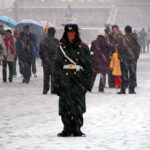Still a long way to go for Australia’s gun laws
After the Port Arthur massacre in Tasmania 17 years ago, Australia’s gun laws were significantly tightened. With Firearm Consultative Committees full of pro gun lobby groups, there is still a lot to be done, says Samantha Lee from Gun Control Australia.
In response to the Port Arthur shooting a 10-point plan for the regulation of firearms – known as 1996 Nationwide Agreement on Firearms – was implemented. It included a nationwide registration of all firearms, a national licensing system, bans on military semi-automatic style shotguns, the need to prove a genuine reason for owning a firearm and the recording of sales of firearms.
An important aspect about the Nationwide Agreement on Firearms, which pro gun lobby groups failed to note, is that the Agreement did not prevent the ownership of firearms, except the banning of high-powered longarms (unfortunately this ban did not extend to semiautomatic handguns), but introduced critically overdue regulation of firearm ownership. The Agreement attempted to find a balance between the ownership of firearms and the need to protect public safety.
Part of the Agreement is also the requirement of persons to demonstrate a “genuine reason” to own a firearm acknowledging that in Australia, unlike America, firearm ownership is a privilege and not a right.
Recently, John Howard wrote a piece for the New York Times urging President Obama to take a strong stance on firearm laws in wake of the Sandy Hook School shooting in the United States, where 20 first graders and five teachers were killed.
Although it is unusual for former Prime Ministers of Australia to be commenting on America’s internal affairs, John Howard has good reason to be spruiking Australia’s tough stance on guns. Since the 1996 gun laws were introduced, Australia has had no gun massacres, compared with 13 during the previous 18 years. Gun deaths in Australia have fallen from around 600 in the early 1990s to now fewer than 250. Although gun deaths were beginning to fall before 1996, the rate of reduction accelerated after the new laws were introduced. The most significant fall has been an almost 80 per cent decline in firearm suicides.
But shamefully the United States Senate failed to follow John Howard’s honourable stance on gun laws by voting down 54-46 what most Australians would now consider the most basic of gun laws, that is the expansion of police background checks on sales of firearms and banning of some ‘assault’ weapons in Australia.
A lesson for Australia to learn from the failure of the United States Congress to support tough gun laws is that firearms laws are not to be taken for granted and are susceptible to erosion by the force of pro gun lobby groups.
In the last two years, the Commonwealth, Queensland and New South Wales have all established Firearm Consultative Committees to advise government on firearm issues.
The Committees are stacked with pro gun lobby groups and include no gun control, public health, domestic violence or suicide prevention representatives. The membership includes: Rob Nioa, Managing Director of one the largest arms importers in the country, the Sporting Shooters Association, Field and Game Council, Coalition for Women Shooting and Hunting and Federation of Hunting Clubs and Game Council.
The pro gun make-up of these Firearm Consultative Committees has ensured a focus on reducing “red tape” and “regulatory burden” for gun owners, rather than increasing public safety for all.
Samantha Lee is a spokesperson for Gun Control Australia. In 1996 after the Port Arthur massacre I began volunteering for National Coalition for Gun Control (now Gun Control Australia). I work in law and was awarded a Churchill Fellowship to research reducing handgun crime in Australia.















rollie
August 14, 2013 at 9:35 am
something fishy
Handed my 22 magnum leaver action rifle into police when they had the buy back. Two weeks ago they rang me up and asked me if I owned it. I said I handed it back and received money. Now the serial number has turned up in Kingston – I thought they destroy them. Lol wonder if I could have it back, as they can't look after it…